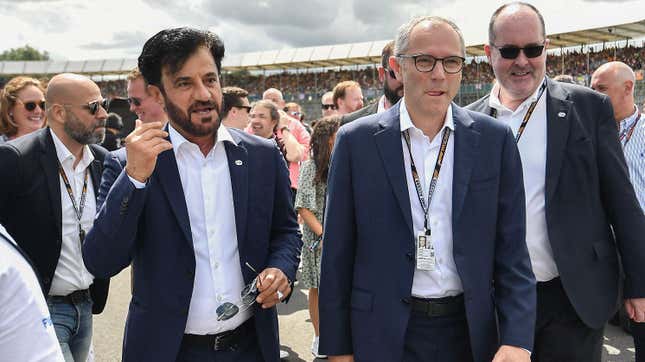
It’s easy to get swept up in the excitement of a new team potentially joining the Formula 1 World Championship. It’s been seven years since Haas, the newest team, joined the F1 grid. The Andretti bid, backed by General Motors, has been the most appealing of the potential new entries. It would be easy to assume that F1 would roll out the red carpet for a reputable American racing team with the support of one of the world’s largest automakers. However, the entirety of Formula 1 circled the wagons to fight Andretti or any new team joining.
F1 President and CEO Stefano Domenicali made comments to Autosport regarding the current application process for new entrants. Domenicali doubled down in his position that he won’t let a new team join the championship. The former Ferrari team principal said to the publication:
“On that, I’m not changing my mind. It’s not the money, as we have said, and I don’t want to anticipate anything because there is a process and I think that I have respect the fact the FIA launched their process, and very soon we will arrive at the conclusion.”
“As we always said, we need to make sure that the decision is right for the business. And this is what I think is the duty of the FIA and us together, that has to be taken. So that is another decision that will be taken in the next couple of months.”
The FIA, the sport’s governing body, might run the application process but Formula One Management, the commercial rights holder, can deny any new team entry to the championship. F1 and the teams previously agreed to a $200 million anti-dilution fee for new entrants. However, an idea of a $1 billion fee was floated once Andretti-Cadillac stated it would pay the initial amount.
It has become clear that the goalposts will always move to keep out an 11th team, as an outright ban is impossible because Formula One’s regulations allow up to 13 teams. Mercedes F1 team principal and stakeholder Toto Wolff said that any new team should buy out an existing team. According to RaceFans, Michael Andretti said he had approached every F1 team, and no one was selling.
With Formula 1 entering a boom period where costs are capped and revenue starting to swell from new Grand Prix events and television contracts, F1 team ownership might finally be a lucrative endeavor. The existing teams don’t want to share that windfall with anyone regardless of the potential impact of burning bridges with a country or a manufacturer.

